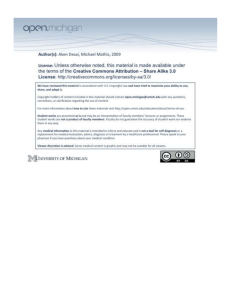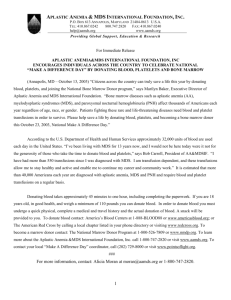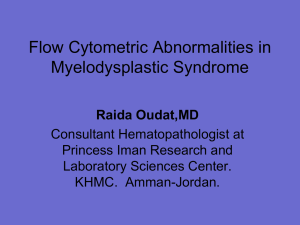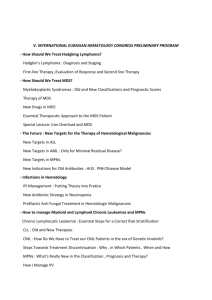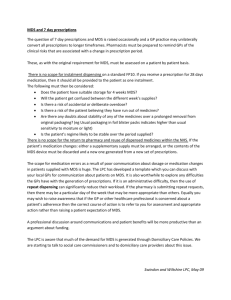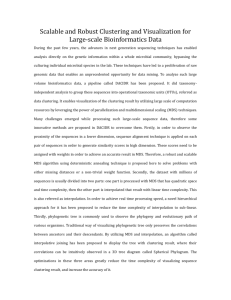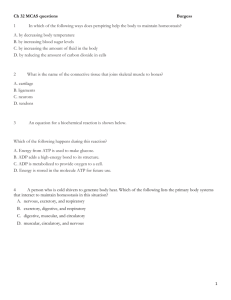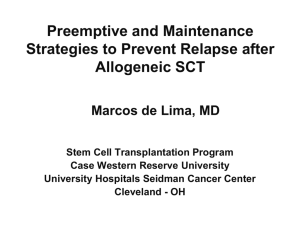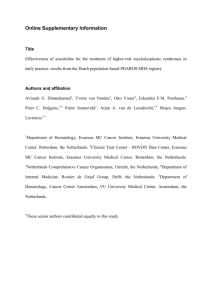Daily-Mail-article-RT-March2010
advertisement
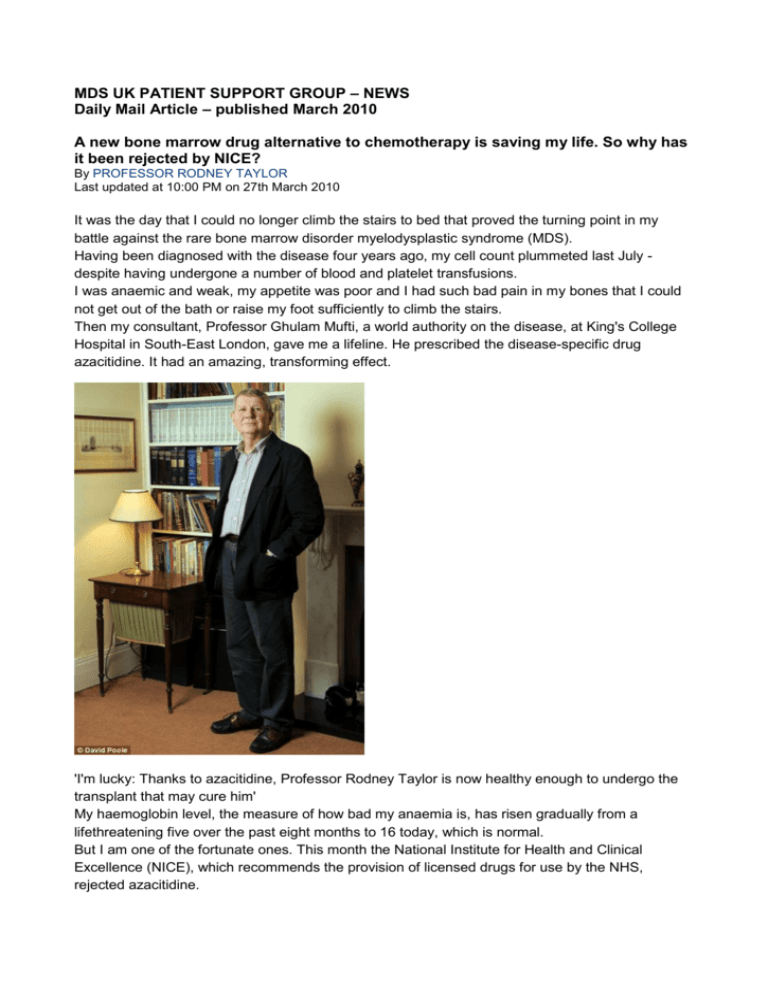
MDS UK PATIENT SUPPORT GROUP – NEWS Daily Mail Article – published March 2010 A new bone marrow drug alternative to chemotherapy is saving my life. So why has it been rejected by NICE? By PROFESSOR RODNEY TAYLOR Last updated at 10:00 PM on 27th March 2010 It was the day that I could no longer climb the stairs to bed that proved the turning point in my battle against the rare bone marrow disorder myelodysplastic syndrome (MDS). Having been diagnosed with the disease four years ago, my cell count plummeted last July despite having undergone a number of blood and platelet transfusions. I was anaemic and weak, my appetite was poor and I had such bad pain in my bones that I could not get out of the bath or raise my foot sufficiently to climb the stairs. Then my consultant, Professor Ghulam Mufti, a world authority on the disease, at King's College Hospital in South-East London, gave me a lifeline. He prescribed the disease-specific drug azacitidine. It had an amazing, transforming effect. 'I'm lucky: Thanks to azacitidine, Professor Rodney Taylor is now healthy enough to undergo the transplant that may cure him' My haemoglobin level, the measure of how bad my anaemia is, has risen gradually from a lifethreatening five over the past eight months to 16 today, which is normal. But I am one of the fortunate ones. This month the National Institute for Health and Clinical Excellence (NICE), which recommends the provision of licensed drugs for use by the NHS, rejected azacitidine. Recently it has also rejected nine other drugs that could have benefited more than 16,000 cancer patients in the UK - on the grounds that they are too expensive. While NICE recognised that azacitidine was clinically effective and extended end-of-life treatment, according to their specific criteria, they decided not to approve it for people with MDS, chronic myelomonocytic leukaemia or acute myeloid leukaemia as it costs £45,000 a year per person. That is nothing compared with the total costs of radiotherapy, chemotherapy, surgery and post-op care which can mount up to more than £100,000. As a physician - I am currently a visiting Professor of Bioethics at St Mary's University College and a tutor in medical ethics and law at Imperial College School of Medicine - I believe that decision is wrong. As the deputy chairman of the MDS UK Patient Support group and a member of Patients Involved in NICE, I am appealing to them to reverse that ruling on behalf of the 700 patients a year who need the drug. MDS is a debilitating disease, affecting one in 25,000 people in Britain. It can lead to complications such as recurrent or life-threatening infections or bleeding if platelet levels drop. Most patients rely on frequent blood transfusions to manage anaemia and extreme fatigue, as well as platelet transfusions. While the average survival of patients with MDS is about 20 months, 30 per cent progress to acute myeloid leukaemia, a very aggressive and resistant form of leukaemia , with an average survival period of only a few months. Azacitidine, which is manufactured by Celgene under the trade name Vidaza, is the only licensed drug available to specifically treat MDS and has proved not only to slow the progress of the disease but to improve patients' quality of life by freeing them from repeated blood transfusions. It certainly has improved mine. I was first diagnosed with MDS in 2006 aged 64 when I was working as a consultant gastroenterologist at Ealing Hospital. I had been on holiday in Libya with my wife Janet, an obstetrician and gynaecologist, eating a Mediterranean/North African diet with no alcohol, and thought it was a great opportunity to measure my cholesterol. However, after I had a blood test, my haematologist said: 'This is not right.' The neutrophils, those white blood cells that are needed to fight infection, were seriously reduced. At the time I was pretty well in myself. I had no symptoms so, although I was concerned, I thought: 'This can't be that bad.' I knew acute myeloid leukaemia was a risk but I was fairly optimistic. I told my children - Alice, 29, a vet, Romilly, 27, an economist, and Beatrice, 24, a teacher - and carried on as normal, having blood tests at three to six-monthly intervals to monitor my blood picture. The following year I retired from clinical practice but it was not until the autumn of 2008 that I noted an insidious change. I was due to be going to Singapore and Australia with Janet for a working holiday but I felt tired, lacked energy and didn't feel up to it, so I cancelled. I returned to King's, where tests revealed that my red and white blood cell lines and my platelets had dropped. I was anaemic so I was given two drugs - granulocyte colony-stimulating factor (GCSF), which stimulates the bone marrow to produce white blood cells, and erythropoietin, which stimulates the bone marrow to produce red blood cells. These came in pre-loaded syringes, and I injected myself, one twice weekly and the other weekly. They did not have the desired effect so I had to have eight blood transfusions over the next six months, and two lots of platelets to lower my risk of bleeding. I would spend the day at the West Middlesex University Hospital, near my home at Hampton Hill in South-West London, having three 300ml units of blood run into my body through a cannula into a vein in my arm. Each unit took about two hours, so these were boring days. The following day I would feel almost normal again although still more tired - I was inclined to doze off during the afternoon, which was not like me. Then, three weeks later, I would go through the whole cycle again. After I deteriorated, King's put me into a research programme on azacitidine. The unpleasant alternative, which other patients will have to endure unless NICE reverses its decision, is chemotherapy - or just best supportive care. Although I have to travel to King's for a week a month for the oneminutejab - I began with 14 injections-over seven days and am now down to five injections in five days - it has transformed my life. I am now well enough to have a bone marrow transplant, the only potential cure for MDS - 40 per cent of those who have transplants live beyond two years. I have three potential donors and am hoping to have the operation this summer. I could remain on azacitidine longer but then I would be that much older and my condition could worsen again despite drug treatment. A successful transplant depends on a lot of things, not just the match but the state of your heart, lungs, kidney and liver. If you are well, you optimise your chances. Generally those who remain on azacitidine are not eligible for transplantation. Anecdotally, I know of somebody who has taken it for seven years and is still in good health. Even so, I am understandably quite apprehensive. I will have to have chemotherapy to suppress my bone marrow and immuno-suppression drugs so that I don't reject the transplant. I anticipate being in hospital for six weeks, during which time visiting will be very limited, as I will be at high risk of acquiring infections. But if all goes well, I will have a new lease of life and the prospect of a cure. That would not have been possible without azacitidine. Daily Mail – March 2010 Link to online version: http://www.dailymail.co.uk/health/article-1261234/A-new-bone-marrow-drug-alternative-chemotherapy-savinglife-So-rejected-NICE.html ********************** March 2012 – Update – MDS UK Patient Support Group 2 years after this article was published. Prof Rodney Taylor is still receiving treatment with azacitidine and doing extremely well. He is now on a maintenance dosage of azacitidine – which is a lower dosage – but administered with the same regular pattern of 7 injections for a week – followed by 3 weeks off. He has not needed any further transfusions. He is still being carefully monitored and has to undergo a bone marrow biopsy every 6 months to make sure there is no change in his bone marrow cells. He is now also Chairman of MDS UK, co-chair of PiN (Patients Involved in NICE) and tries to attend as many events related to MDS as possible – all of it on a volunteer basis - as well as continuing to work as a visiting professor of bio-ethics – amongst other things. We are extremely grateful for his continued kind assistance, support and advice. Azacitidine update Following the NICE guidance issued March 2011 - this drug – azacitidine (Brand name-Vidaza) – is now available on the NHS – for all MDS patients with an IPSS score (Prognostic score) of Intermediate 2 or High-Risk MDS, as well as Chronic Myelomonocytic Leukaemia (CMML) and Acute Myeloid Leukaemia (AML) patients. Sophie Wintrich Chief Executive MDS UK Patient Support Group **********************
